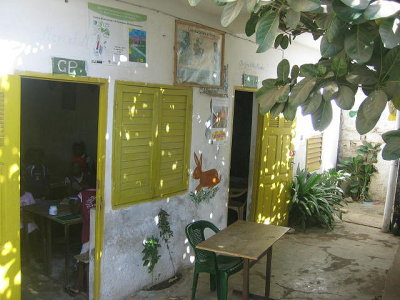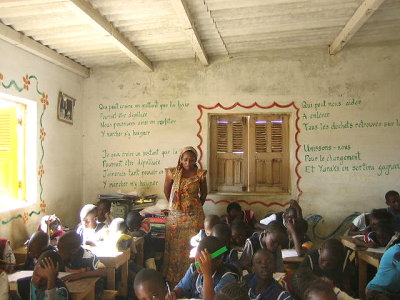There are no translations available.
Khadim Primary School in Hann, Senegal
 A pioneer in environmental education towards primary school children despite the meager means at its disposal
A pioneer in environmental education towards primary school children despite the meager means at its disposal
Environmental education, including that relating to the marine environment and its ecosystems, must find its place in the school curriculum, given the multiple threats to the marine environment as a whole. This is all the more justified and necessary for young school children from coastal communities - for several major reasons.
First, these communities are economically dependent on marine ecosystems for basic food and income. But they also have a specific culture that we can call "marine". This is seen in a school, which is an integral part of the fishing community.
 Secondly, as a corollary, these two roles - to reflect economic and cultural dimensions - could not be maintained in the long term without a collective awareness on the part of young people, who constitute more than half of Senegal's population. They need to be aware of the need to combine good management and conservation of resources (particularly for some endangered species) that our ecosystems provide.
Secondly, as a corollary, these two roles - to reflect economic and cultural dimensions - could not be maintained in the long term without a collective awareness on the part of young people, who constitute more than half of Senegal's population. They need to be aware of the need to combine good management and conservation of resources (particularly for some endangered species) that our ecosystems provide.
Only recently have the Senegalese authorities effectively started to recognise the importance of integrating environmental education into school curricula as part of a regional project. Indeed, it is especially since about three years, in collaboration with IUCN, that the Regional Programme of Environmental Education (PREE) is implemented. It first needed to set up the institutional base for the development of the curriculum. We can say that the activities in the school are still at the initial stage.
In addition to specific programmes in relation to ecosystems and the marine environment, Khadim School develops an awareness of its young pupils focused on the links between the land and the sea. These are explained during the trips organised periodically to the Hann zoo and forest. This is the only remaining “green lung” for the city of Dakar, which has lost its green spaces to the development of real estate.
 The Khadim School in Hann is also actively involved in pilot activities in the framework of the FAO - EAF Nansen project. These aim at testing teaching aids developed by Mundus maris to support the introduction of ecological concepts into the curriculum, such as marine ecosystems approaches to sustainable fisheries. It thus provides concrete experimental opportunities relevant also to the efforts of the Regional Programme for Environment Education (PREE), which engages IUCN together with the ministries of education of seven NW African countries. The school has a track record of working on environmental themes, even before they received wider official recognition. Examples are some earlier efforts, such as beach clean up and drawing attention to the pollution from untreated waste from Dakar provoking unhealthy conditions in Hann Bay. These are illustrated in the article on the FAO - EAF Nansen project.
The Khadim School in Hann is also actively involved in pilot activities in the framework of the FAO - EAF Nansen project. These aim at testing teaching aids developed by Mundus maris to support the introduction of ecological concepts into the curriculum, such as marine ecosystems approaches to sustainable fisheries. It thus provides concrete experimental opportunities relevant also to the efforts of the Regional Programme for Environment Education (PREE), which engages IUCN together with the ministries of education of seven NW African countries. The school has a track record of working on environmental themes, even before they received wider official recognition. Examples are some earlier efforts, such as beach clean up and drawing attention to the pollution from untreated waste from Dakar provoking unhealthy conditions in Hann Bay. These are illustrated in the article on the FAO - EAF Nansen project.
Photos by Ibrahima Seck.








